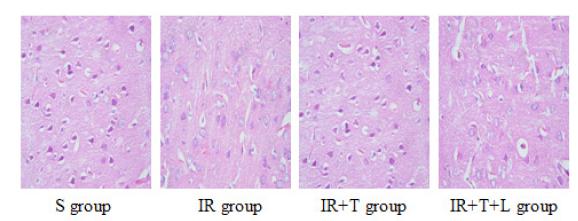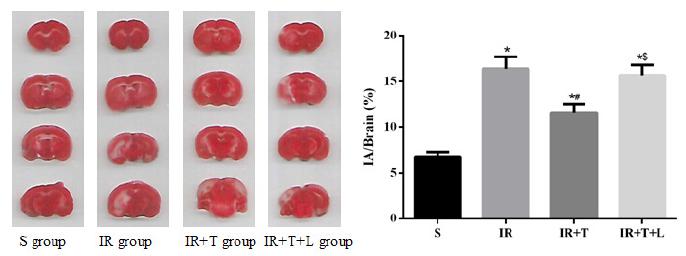Abstract
Purpose:
To investigate whether the neuroprotective effect of TSA on cerebral ischemia reperfusion injury is mediated by the activation of Akt/GSK-3β signaling pathway.
Methods:
Mice were randomly divided into four groups (n=15): sham group (S); ischemia reperfusion group (IR); ischemia reperfusion and pretreated with TSA group (IR+T); ischemia reperfusion and pretreated with TSA and LY294002 group (IR+T+L). The model of cerebral ischemia reperfusion was established by 1h of MCAO following 24h of reperfusion. TSA (5mg/kg) was intraperitoneally given for 3 days before MCAO, Akt inhibitor, LY294002 (15 nmol/kg) was injected by tail vein 30 min before the MCAO.
Results:
TSA significantly increased the expression of p-Akt, p-GSK-3β proteins and the levels of SOD, Bcl-2, reduced the infarct volume and the levels of MDA, ROS, TNF-α, IL-1β, Bax, Caspase-3, TUNEL and attenuated neurological deficit in mice with transient MCAO, LY294002 weakened such effect of TSA dramatically.
Conclusions:
TSA could significantly decrease the neurological deficit and reduce the cerebral infarct volume, oxidative stress, inflammation, as well as apoptosis during cerebral ischemia reperfusion injury, which was achieved by activation of the Akt/GSK-3β signaling pathway.
Key words:
Histone Deacetylases; Glycogen Synthase Kinase 3 beta; Brain Ischemia; Reperfusion Injury; Mice

 S group=sham group, IR group=cerebral ischemia reperfusion group, IR+T group= cerebral ischemia reperfusion+TSA (HDAC inhibtor) group, IR+T+L group= cerebral ischemia reperfusion group+TSA+LY294002 (Akt inhibitor) group.
S group=sham group, IR group=cerebral ischemia reperfusion group, IR+T group= cerebral ischemia reperfusion+TSA (HDAC inhibtor) group, IR+T+L group= cerebral ischemia reperfusion group+TSA+LY294002 (Akt inhibitor) group.
 *P<0.05, vs. S group; #
P<0.05, vs. IR group; $
P<0.05, vs. IR+T group.
*P<0.05, vs. S group; #
P<0.05, vs. IR group; $
P<0.05, vs. IR+T group.
 *P<0.05, vs. S group; #P<0.05, vs. IR group; $P<0.05, vs. IR+T group.
*P<0.05, vs. S group; #P<0.05, vs. IR group; $P<0.05, vs. IR+T group.
 *P<0.05, vs. S group; #P<0.05, vs. IR group; $P<0.05, vs. IR+T group.
*P<0.05, vs. S group; #P<0.05, vs. IR group; $P<0.05, vs. IR+T group.
 *P<0.05, vs. S group; #P<0.05, vs. IR group; $P<0.05, vs. IR+T group.
*P<0.05, vs. S group; #P<0.05, vs. IR group; $P<0.05, vs. IR+T group.
 *P<0.05, vs. S group; #P<0.05, vs. IR group; $P<0.05, vs. IR+T group.
*P<0.05, vs. S group; #P<0.05, vs. IR group; $P<0.05, vs. IR+T group.
 *P<0.05, vs. S group; #P<0.05, vs. IR group; $P<0.05, vs. IR+T group.
*P<0.05, vs. S group; #P<0.05, vs. IR group; $P<0.05, vs. IR+T group.